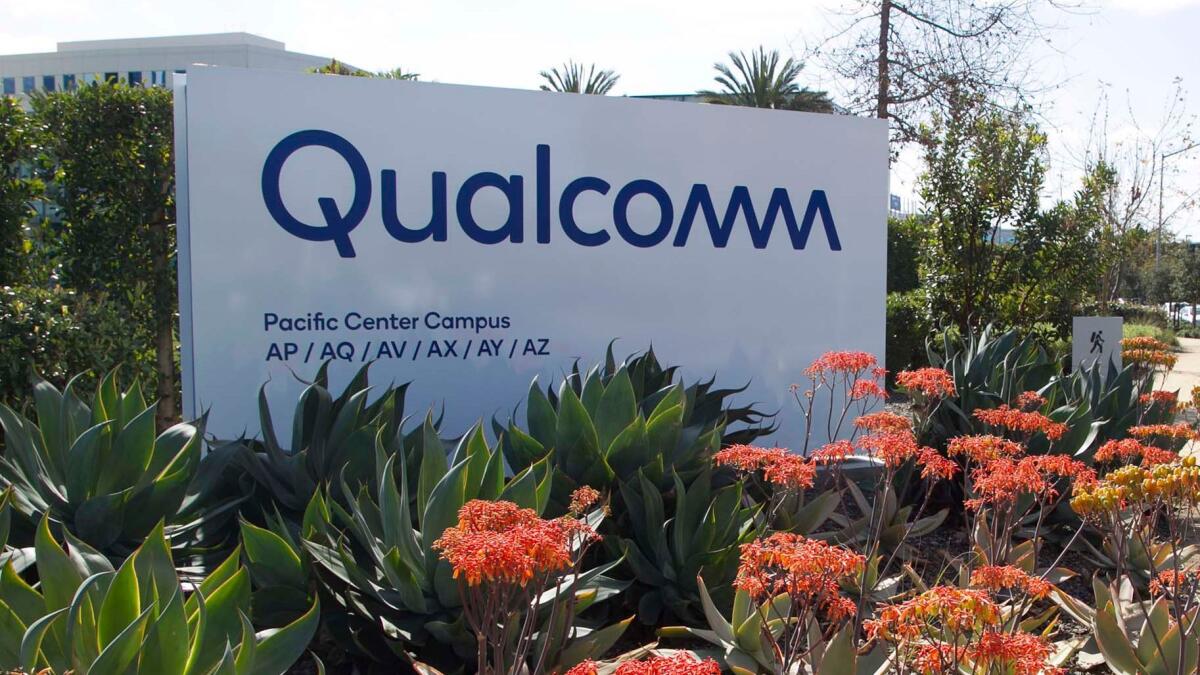U.S. outlines national security concerns over Broadcomâs bid to buy Qualcomm

U.S. officials worry that if Broadcom Ltd. succeeds in its hostile takeover of Qualcomm Inc., that might weaken the San Diego chip maker and open the door for China to become the leader in next-generation wireless technologies, among other national security concerns.
The Treasury Department laid out its concerns in a letter to both chip makers explaining its Sunday order to delay Qualcommâs annual shareholder meeting. At the meeting â previously scheduled for Tuesday â the San Diego companyâs shareholders were to vote on whether to hand control to Broadcom by putting Broadcom-backed candidates on Qualcommâs board of directors.
The secretive Committee for Foreign Investment in the United States, or CFIUS, ordered the 30-day delay so it could further investigate the national security implications of a takeover of Qualcomm by Broadcom, which is based in Singapore and San Jose. CFIUS is a multi-agency body led by the Treasury.
Qualcomm included the letter in a filing Monday with the U.S. Securities and Exchange Commission. Its shareholder meeting is rescheduled for April 5.
The $117-billion deal would be the largest in semiconductor industry history. Qualcommâs board has rejected Broadcomâs $79-per-share bid, saying the offer is too low and fails to provide enough protection if regulators block the takeover. The San Diego company also sought the CFIUS review.
In the letter, Treasury officials said Qualcomm is a product supplier to the U.S. government and is working with it on cybersecurity for the next generation of wireless, 5G and the internet of things. Any changes in supply of these products or services could pose national security concerns.
Many of the national security concerns surrounding the potential takeover are classified, the letter said. Some relate to Broadcomâs relationships with third-party foreign entities.
The letter raised red flags that a Broadcom takeover could weaken Qualcommâs long-term competitiveness in telecommunications technologies and standard-setting â which could open the door for Chinese companies such as Huawei to become dominant players in upcoming 5G networks.
The 5G networks are expected to begin rolling out in 2019, bringing ultra-fast and reliable connectivity to cars, healthcare devices, infrastructure and beyond. According to the letter, Huawei has been increasing its research and development work in 5G and owns about 10% of essential patents for 5G technology.
âWhile the United States remains dominant in the standards-setting space currently, China would likely compete robustly to fill any void left by Qualcomm as a result of this hostile takeover,â the letter said.
Broadcom has pledged to move its headquarters from Singapore to the U.S., possibly as soon as May. It said it is cooperating with CFIUS and is committed to making the combined company a global leader in 5G and other technologies.
âThere can be no question that an American Broadcom-Qualcomm combination will provide far more resources for investments and development to that end,â Broadcom said. âEntrusting this effort to a failing Qualcomm management who lacks the support of its owners, and that pays out much of its excess cash flow in fines as a result of serial lawbreaking, would not be in Americaâs long-term interests.â
Broadcom has nominated six candidates for Qualcommâs 11-member board of directors in hopes of pushing forward its acquisition.
Bloomberg reported Monday that Broadcomâs board candidates were getting substantial support from angry Qualcomm shareholders in early voting.
For more than three years, Qualcommâs stock has been weighed down while the stock market overall has soared. Much of the companyâs troubles stem from its patent licensing business, which has been in the crosshairs of competition regulators and is at the center of a fierce ongoing legal battle with Apple Inc. over patent fees.
In their letter, Treasury officials said that if Broadcom acquires Qualcomm, the company could take a âprivate equityâ-style direction, which means reducing long-term investments such as research and development and focusing on short-term profitability.
The $106 billion in debt that Broadcom has lined up to pay for its hostile takeover also could increase pressure on the company to cut long-term spending on research and development, according to the letter. In the past dozen years, Broadcom has spent six times as much on acquisitions as it has on research and development.
The letter raised concerns over Broadcomâs plans for Qualcommâs patent licensing arm, which funds much of its research and development. Broadcom has not been specific in its plans for patent licensing other than to say the business model is broken.
Qualcomm shares fell 2.9% on Tuesday to close at $62.14. Broadcom shares rose 1.6% to $250.96.
UPDATES:
1:35 p.m.: This article was updated with comment from Broadcom and with stocksâ closing prices.
This article was originally published at 12:05 p.m.






